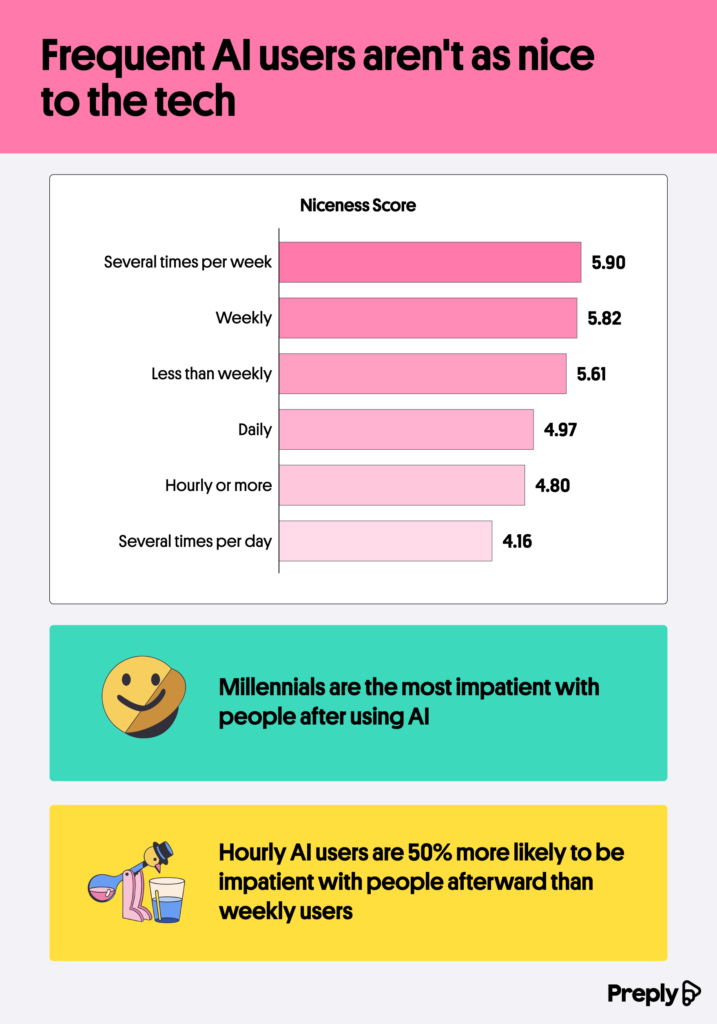Ever found yourself politely saying, “Please,” to your Alexa device? Or perhaps barking out a frustrated, “Speak to a representative!” into your phone to a relentless AI operator?
Interactions with AI are becoming more a part of our everyday lives, but they’re still a mixed bag, from the effortlessly convenient to the mind-numbingly frustrating. A recent Preply study surveyed Americans on their use of language with Artificial intelligence, finding that some of us handle these ups and downs a little better than others.
How Americans treat AI by age group
Surprisingly, the least tech-literate generation — the people most likely to get frustrated by technology — are also the kindest to Artificial intelligence. On Preply’s scale, which awarded positive points for polite interactions and negative points for impolite ones, baby boomers beat out any other generation by a long shot, earning an impressive niceness score of 6.59.

Gen X earned a respectable 5.54, while tech-savvy millennials scored a decent 5.20 on the civility meter. However, the digital natives of Gen Z trailed way behind with a score of 5.08.
Despite being born and bred in the digital world, Gen Z are the least likely to extend the same courtesy to AI-based customer service as they would to their carbon-based counterparts. At the same time, Gen Zers are also twice as likely to feel guilty about their bad Artificial intelligence manners as compared with baby boomers — maybe because they know all too well that our interactions with AI today shape the technological landscape of tomorrow.
Where Americans treat AI the best and worst
Our AI etiquette might even vary by region. Turns out that AI’s best buddies reside in New Mexico, Maryland, and Florida, while folks in Connecticut, West Virginia, and Michigan fall on the other end of the spectrum.
Preply’s study also exposes some fascinating state quirks. For example, 12% of respondents in Indiana claim they’re nicer to Artificial intelligence chatbots than they are to actual humans. In Massachusetts, 10% of residents confess to playing nice with AI out of fear of the potential consequences. And Virginia emerges as the state most open to being polite to AI across the board.
American AI interaction trends
Maybe you’ve caught a friend or loved one giving AI an earful — or done it yourself. It’s one of the most common ways Americans vent their frustration with technology. Beyond raising our voices, some even resort to belittling or insulting their digital assistants, humanizing them just enough to channel their annoyance.
For the overwhelming majority (82%), if we are polite with AI, it comes out of habit. But, as the saying goes, familiarity breeds contempt — the more frequently we interact with AI, the more comfortable we are ripping these friendly automatons a new one.
And although women are nicer to Artificial intelligence on average, men are more often satisfied with the outcomes of their interactions. Maybe from venting all their frustration?
Conclusion
As AI becomes more a part of our everyday, our interactions with it are only increasing. Though it’s natural to feel frustrated at times — especially when you’re stuck in a seemingly endless loop and can’t get through to a real person — it’s important to remember that AI is a developing technology. Not just to say it’s imperfect now but also that it’s influenced by how we interact with it.
So the next time you find yourself throwing out frustration to Siri or yelling at your GPS, remember, a little courtesy might go a long way in shaping more positive human-AI interactions down the line.